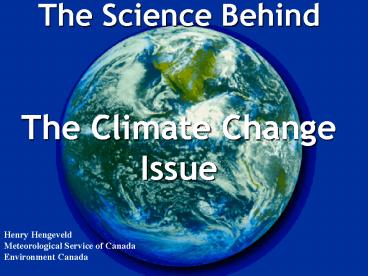The Science Behind
1 / 21
Title: The Science Behind
1
The Science Behind The Climate Change Issue
Henry Hengeveld Meteorological Service of
Canada Environment Canada
2
Climate change science is complex science
- Involves many different disciplines
- Has benefited from several decades of intensive
research - Globally, several thousand papers currently
published each year, at an annual cost of US 3
billion - Like a huge jigsaw puzzle having 10s of thousands
of pieces - Requires comprehensive international effort
involving experts from all disciplines involved
to properly assess
3
Cautious
4
Are the IPCC results credible?
US National Academy of Science 2001 report to
President Bush
- The most recent IPCC assessment isan admirable
summary of research activities in climate science
Joint statement by Academies of Science from 17
other countries May 2001
The work of theIPCC represents the consensus of
the international science community on climate
change science. We recognize IPCC as the worlds
most reliable source of informationand endorse
its method of achieving this consensus.
5
The earths atmosphere provides several
important life supporting services
Suitable, stable climate and weather
Protection from solar uv-b (stratospheric ozone)
stratosphere
surface
thunderstorm
troposphere
The air we breath (21 oxygen)
6
7
Current greenhouse gas concentrations are
unprecedented in at least the past 400,000 years
8
Global surface temperatures are rising
9
Modelled response to natural forcings differs
from observed temperatures during past 50 years
10
Modelled response to all forcings agrees best
with observations
11
Current NH temperatures are very unusual within
at least the past 1000 years
12
The physical world is dramatically changing
13
There is new and stronger evidence that most of
the warming observed over the last 50 years is
attributable to human activities.
Intergovernmental Panel on Climate Change 2001
14
The world will MUCH, MUCH warmer
15
Projected temperature changes vary considerably
from year to year
16
Changes in precipitation patterns by 2050
are uncertain, but will be complex
17
Extreme cold days will become much less cold
2090s
2050s
One in ten year extreme (ºC )
1980s
18
CGCM1 results suggest very hot days across Canada
will become much hotter
2090s
2050s
One in ten year extreme (ºC )
1980s
19
The frequency and severity of droughts are also
likely to increase in southern Canada
20
while extreme precipitation events are likely to
become more frequent
Extreme Precipitation Events (Canada)
95
21
Extreme events can cause many types of disasters
























![Read [PDF] How God Works: The Science Behind the Benefits of Religion](https://s3.amazonaws.com/images.powershow.com/10083622.th0.jpg?_=20240723064)
![[PDF] The Science of Fortnite: The Real Science Behind the Weapons, Gadgets, Mechanics, and More! Free](https://s3.amazonaws.com/images.powershow.com/10089921.th0.jpg?_=20240801030)





